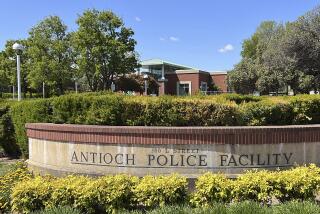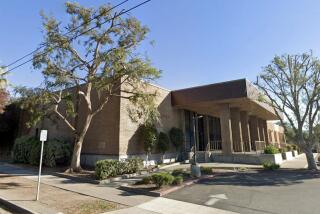Man Gets 5 Years in ‘Freemen’ Check-Fraud Scheme
- Share via
Calling him part of the “lunatic fringe,” a federal judge sentenced a Santa Clarita man to five years in prison Tuesday for his part in a “freemen” scheme to sell millions of dollars in fraudulent checks.
Barry Switzer, 51, was convicted in October of 11 counts of mail fraud and passing a false government obligation in a scheme that operated in the Antelope and Santa Clarita valleys up to early 1996, said Pamela Johnston, an assistant U.S. attorney who prosecuted the case.
Tuesday, Switzer was also ordered by U.S. District Judge Dickran Tevrizian to pay an $18,000 fine and placed on three years’ probation following his release from prison, Johnston said.
Switzer’s attorney, Phil Deitch, could not be reached for comment.
Along with Switzer, Elizabeth Broderick--the leader of the ring--and Julian Cheney were convicted of conspiracy, fraud and money laundering charges for the scheme that netted $1.2 million, said Thom Mrozek, a spokesman for the U.S. Attorney’s office.
Broderick is now serving a 16-year prison term in Texas and Cheney’s sentencing is scheduled for next Monday, Mrozek said.
Two others--Adolph Hoch and his daughter Laura Marie Hooey, both of Loma Linda--pleaded guilty to being involved in the scheme, Mrozek said. Hoch was sentenced to 48 months in prison and sentencing for Hooey is pending.
The charges against the five stemmed from an investigation of Broderick--a follower of the Montana group known as the “freemen,” whose key belief is that its members are sovereign and exempt from U.S. laws.
Inspired by tax resister LeRoy Schweitzer--the freemen leader--prosecutors argued that Broderick ran a scheme in which she charged seminar-goers $200 to learn, among other things, how to pay off debt with false warrants she gave them and how to place bogus liens on the properties of creditors who refused to take her checks.
By the time the five were arrested in April 1996, investigators claimed $30 million of the fraudulent checks had made their way into financial institutions.
More to Read
Sign up for Essential California
The most important California stories and recommendations in your inbox every morning.
You may occasionally receive promotional content from the Los Angeles Times.










